Table of Contents
In collaboration with the Australian Government Department of Defence and the Royal Australian Navy, we are excited to bring you this Q&A about nursing in the Royal Australian Navy as a Reservist, by Lieutenant Commander Alison Zilko.
Introduction
My name is Alison Zilko, and I am a Reservist Nursing Officer in the Royal Australian Navy (RAN). I have been a Registered Nurse for over 30 years, and before joining the Navy had experience in Midwifery, Emergency, and Management, as well as raising three beautiful children. I was first introduced to the military when I met my husband during my nursing training. I was fortunate enough to do hospital based nursing training in 1987 at the Alfred Hospital (Melbourne), and it was the era of the original “TOP GUN” release, hence the immediate attraction to a Naval Officer, and commencing my love of all things Navy.
During our family years my husband continued to have a career in the Navy for 37 years, so I was always surrounded by military talk. Once my children were older teenagers, I suddenly had this desire to go and represent my country, and do some good as a Nursing Officer. At 40 years old, after many years of being a nurse at the local hospitals, I decided to join the Navy Reserves, and have an “adventure’ in my life, Boy! What an adventure I have had!!
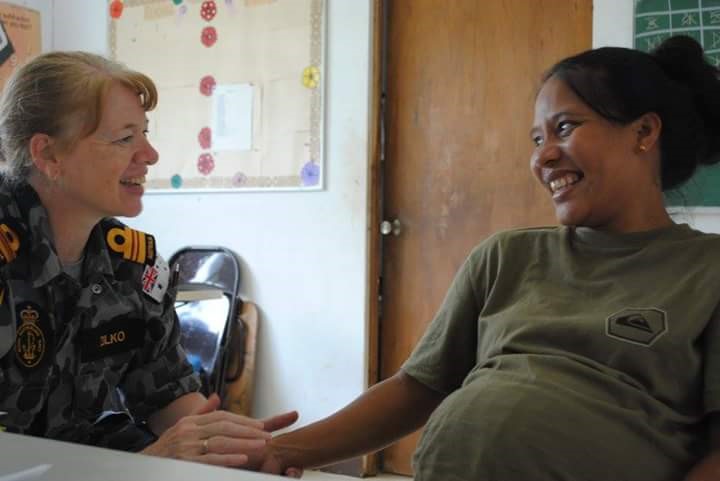
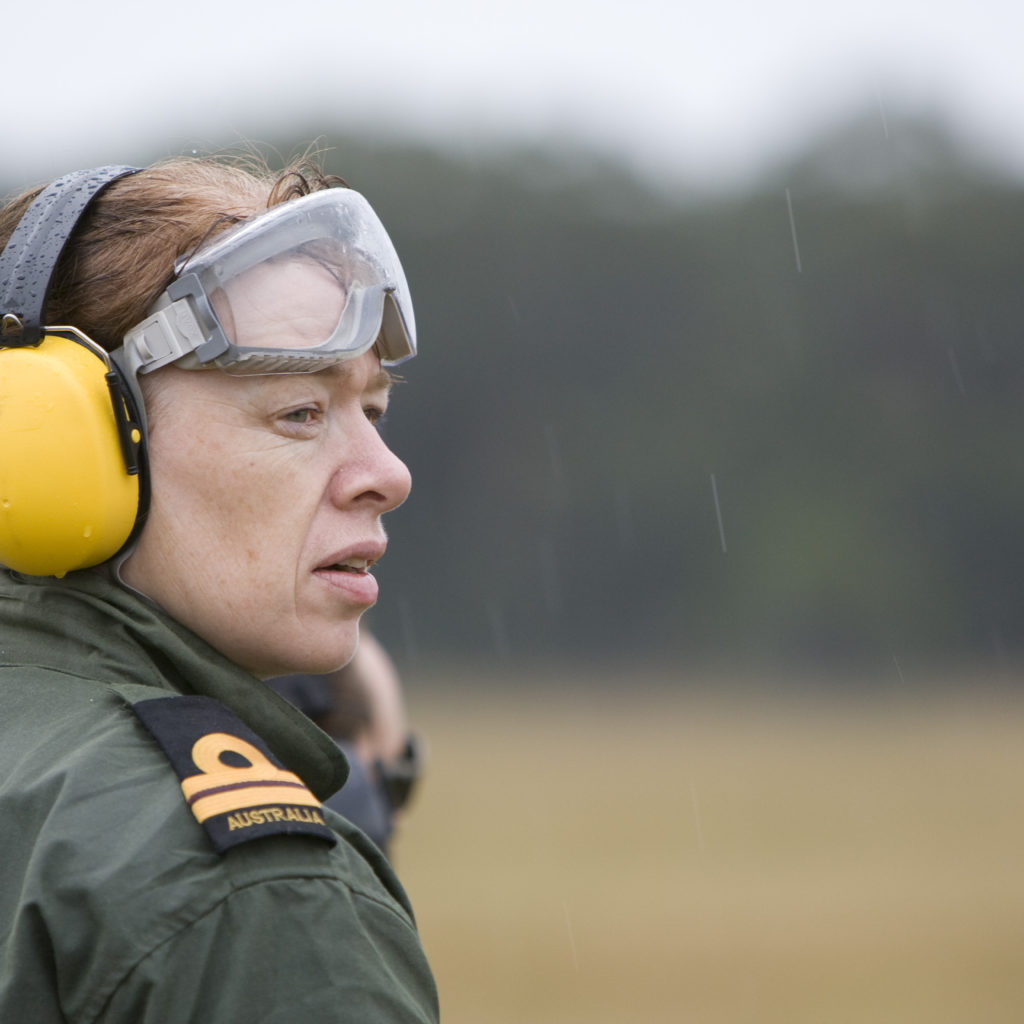
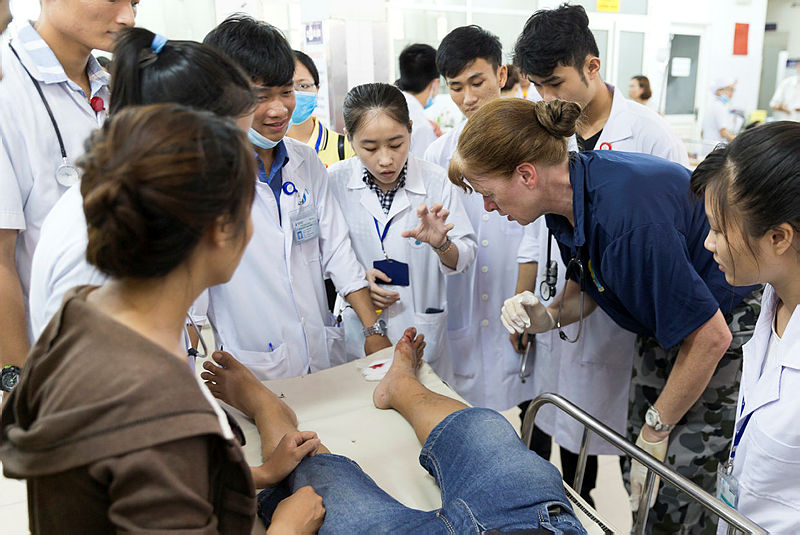
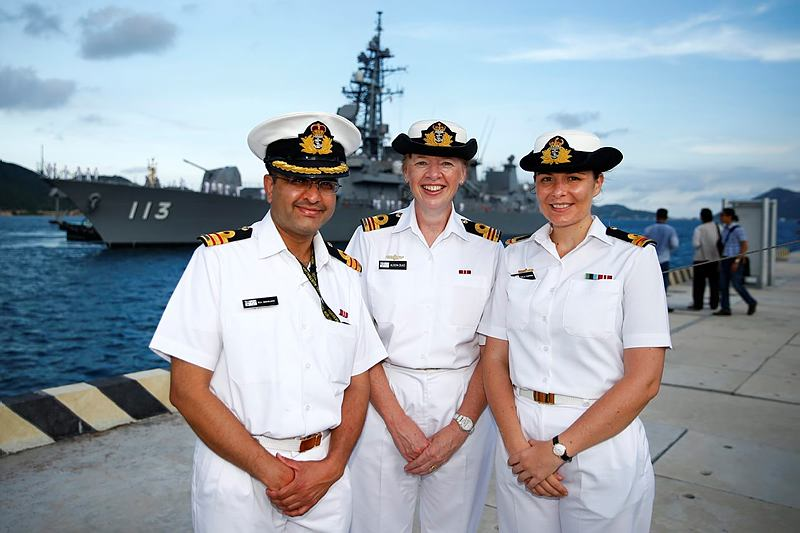
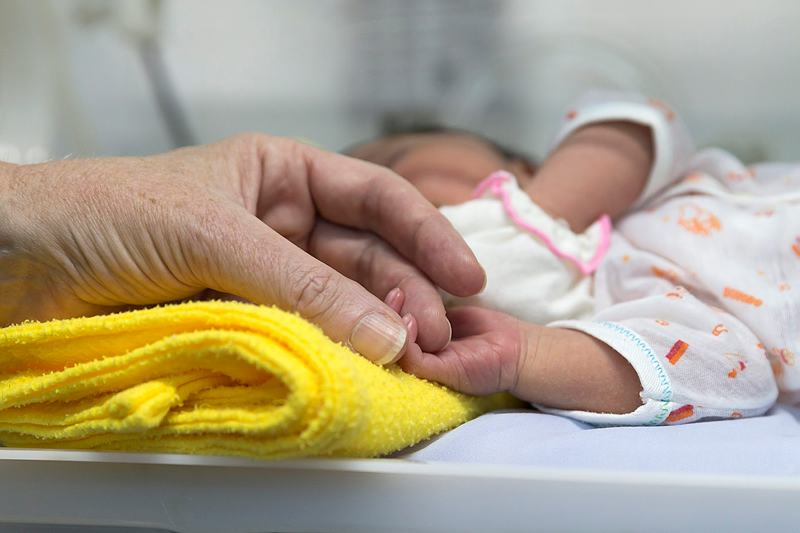
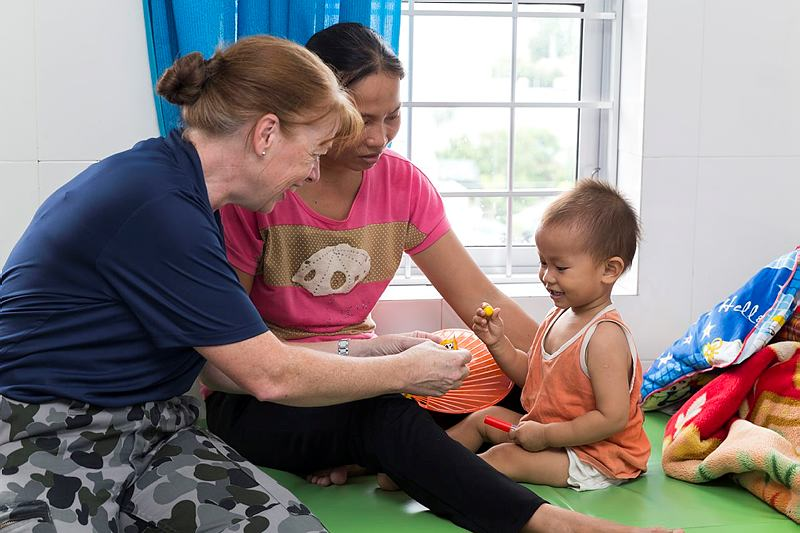
Initial Training
The initial training for a lateral entry Reserve Officer is two weeks at the Royal Australian Naval College at Jervis Bay, where you learn how to become a Naval Officer. This includes swimming in the ocean and learning to survive at sea, eating and living in a dorm with 200 new Officers, and the obligatory 0530 physical training every morning, rain, hail or shine!!
After completion of this initial Officer training, you return back to your life at home for a period of months whereupon you are required to do some distance studies, submit assignments, and keep current with your fitness.
Phase two of Officer Training involves heading back to the Naval College for another two weeks where you complete more complex Officer training. This includes “putting out fires on a warship”, entering a gas chamber and applying a gas mask whilst holding your breath, plugging holes in a “sinking ship”, more 0530 PT, camping and living in the bush for three days, and of course the obligatory cocktail party. All in all, an adventure camp that is the most fun one can have as an adult. Finally, you are posted to sea for a three week deployment to test your “sea legs” and familiarise yourself with life in the real Navy!!
Role of a Nursing Officer
My current role in the Navy varies. For a large proportion of the year, I am a Staff Officer working in Navy Education, managing over 300 personnel who are studying a post graduate course. My second role is as a specialist Nursing Officer, deploying either to sea or on military exercise, depending on the opportunities available. Over the years I have managed to work in my civilian job as an Emergency Nurse/Midwife/Hospital Manager, as well as combining my love of deploying to sea as a Nursing Officer.
During my time in the RAN, I have developed a great interest in Women, Peace and Security, particularly in developing countries, and in 2018 decided to become a Gender Advisor for the Australian Defence Force (ADF). For this I was required to complete an internationally recognised course that allows me to provide Command and Government advice on issues that may affect a community in the event of a disaster. Does the community have running water and medical essentials? Has the food source been affected? How can the Navy support providing supplies? Are the women and children in a safe place with appropriate housing?
At least once or twice a year I will nominate for a sea deployment as either a Nursing Officer or a Gender Advisor. Over the years I have been very fortunate to deploy to sea on military exercises, more commonly as a member of the Maritime Operational Health Unit (MOHU) where we provide a health capability to the deployment, either in local or international waters. On no less than three occasions, I have deployed as a Midwife/Emergency Nurse/Pre-hospital care nurse with a Multinational contingent (PACIFIC PARTNERSHIP), sailing through the Pacific region providing humanitarian care and working with our Pacific allies and friends.
These annual deployments are run by the US Military, and the deployment brings together militaries of the world to provide care and support to countries less fortunate. It is both personally and professionally satisfying and grounding as a nurse, reminding me of the reason I chose to do nursing- to do good for those less fortunate.
As a Nursing Officer, I have also been able to apply my Gender Advisor “hat” to these deployments – quite often in these countries, the women of the land will be more inclined to come and see you and talk to you about their life, their struggles, and their healthcare, and it is from these conversations that I am able to gather an understanding of the concerns of the community, including issues of paternal dominance, domestic violence, poverty, and health care, all of which are vital to broaden my knowledge as a Gender Advisor.
Border Protection 2008- Christmas Island
In 2008 I was tasked with going to sea on a Patrol Boat for a four week trip out to Christmas Island to be the onboard health care provider for Operation Sovereign Borders, which involves intercepting illegal fishing vessels at sea. One of my roles was to assess the passengers onboard these rickety vessels for any injuries or conditions requiring immediate treatment, provide pre-hospital care to various wounds and skin conditions, and providing ongoing health care until the ship could return to port in either Darwin or Christmas Island. Responding to this interview has provided me with a moment of reflection on how close these people came to perishing at sea.
HADR (Humanitarian Assistance Disaster Response) experience – PNG 2013
In 2013 a group of Navy nurses sailed out of Sydney in early June, for a six week trip to Papua New Guinea (PNG) as part of the Australian contingent for PACIFIC PARTNERSHIP. Leaving Sydney harbour, HMAS TOBRUK set sail to the warmer waters of Northern Australia, only to sail into seven metre waves and a dark blue winter sea off the east coast of NSW- the adventure was about to begin! I was sailing with a team of health professionals, including US Army nurses, and with a spirited team on-board, this grand old “Lady of the Sea” was our home for the next six weeks.
The memories of sailing towards PNG include the calmness of the night ocean reflecting off the full harvest moon, the spawning of the coral reef at dusk, and doing aerobics on the back deck at sunset as we travelled through the Whitsundays. Sailing across the Torres Strait and then into the Northern side of PNG, the countryside and lands of this country looked beautiful as we made our way to our first port of Wewak.
What a surprise to see indigenous locals paddling wooden canoes out to see us as we arrived in the local harbour – our welcoming party certainly were mesmerised by this “ big grey ship” in the harbour.
As a health team, we provided invaluable health knowledge to the community, were able to run pre-hospital clinics in the mountains, and share our knowledge in the local hospitals. We were also able to have a firsthand view of tropical ulcers, and medical conditions that we typically would not see in our civilian lives, including sick children with respiratory infections, and chronic skin conditions.
As a group of nurses living in big shared messes, our bunk space was our home – after each day we would come together and share our memories and our stories, learning from each other, and developing a memory log for future deployments to PNG. Over the time of the deployment we laughed, we cried and we made the very best of friends forever.
Tall ships, 2013
In 2013 I was lucky to be selected to provide nursing care and support to two veterans who were participating in the Tall Ship’s journey, run by SOLDIER ON, on HMS LORD NELSON from Hobart to Sydney Harbour. This journey was part of the 200 year celebration of the First Fleet and involved sailing a tall ship, under the guidance of an experienced crew, up the east coast of Tasmania, across Bass Strait, and up the coast into Sydney Harbour.
What an experience, standing at the Ships wheel on a wintery deck as we crossed Bass Strait in eight metre seas. All I could see was a mountain of water and a leaning ship sailing the waves. With a combination of both fear and sheer exhilaration I embraced the wildness of the ocean and gathered a greater appreciation of the sea – who does this sort of thing!!
South Pacific 2015 – PACIFIC PARTNERSHIP
Flying into Hawaii and joining a USNS warship – Millinocket, life for the next six weeks was definitely going to be life changing. A small contingent of Australian health personnel joined MILLINOCKET, and were greeted by a team of health professionals from New Zealand, and a large US team who all made us immediately welcome. The following morning, with pomp and ceremony a multinational health team seat sail for the South Pacific with adventure in our eyes.
Our first port of call was Kiribati, and here our mission was to provide perinatal/pre-hospital/dental/ education to the community as well as partnership building. What would seem simple in any other country, was a challenge in Kiribati as we came to terms with the lack of services, and difficulty to make a difference.
Leaving Kiribati after two weeks, we sailed on to Micronesia and Solomon Islands whereupon the health care situation was still a challenge, but a little less confronting. Our teams were involved in providing dental care, prehospital support and education, midwifery/obstetrics knowledge, health education, and Operating Theatre knowledge. One of the most exciting moments on this six week trip was crossing the equator and meeting King Neptune! Always a fun activity for any ship’s company at sea, and a memory that will be forever ingrained in my life as a Naval Officer.
Vietnam 2017- PACIFIC PARTNERSHIP
This was another PACIFIC PARTNERSHIP deployment, and involved a small contingent of Health Australian personnel flying into Vietnam for two weeks to share knowledge and experiences with the Vietnamese community, and build partnerships for the future. On this deployment, some Australian nursing officers (Midwife /ED and an ICU nurse) joined US Navy personnel engaging with the local hospitals, sharing knowledge and developing a strong partnership with the Vietnamese community, whilst engaging in culture and visiting the historical landmarks of the country.
An Australian Plastic Surgeon performed surgery at the local hospitals, and two underwater medicine doctors educated the local doctors and Defence personnel on use of the underwater decompression facility. I was fortunate enough to be able to share my emergency experience and knowledge, as well as learn new knowledge with the local Emergency Department (ED) doctors and nurses.
Motorbike accidents and drownings appeared to be the most popular presentations to the EDs, as people often don’t wear shoes or helmets when driving their bikes – hence multiple feet/lower limb/head injuries. A truly profound learning experience as a Nursing Officer, and again, a memory to store for the duration…
Naples, Italy, 2019
As a Gender Advisor I was fortunate enough to be asked to deploy to Naples, Italy for a two week summit at NATO, representing the ADF. Here we shared much knowledge, and experience on the current learnings on the role of a Gender Advisor, with northern Europe and African lessons learnt being invaluable for the growing Gender community in Australia. My first trip to Europe, and how proud was I to be wearing an Australian Navy uniform.
How would you differentiate between military nurses and civilian nurses?
Navy Nursing is very different to civilian nursing in that you are a Naval Officer first, and a Nursing Officer second. This means you are required to meet all of the conditions that a Naval Officer meets, including remaining physically fit, living Defence values, and maintaining professional standards.
A Nursing Officer in the Navy can expect to have opportunities to develop skills including Military Trauma Nursing, Peri-Operative nursing, Emergency nursing, and General nursing. You will learn to think strategically in your role as a Naval Officer, and lead a team of medics/junior officers. The Nursing positions in the Navy include:
- Maritime Operational Health Unit (MOHU) deployable health team that can respond to natural disasters/deployment/Government requests at short notice
- Ship’s Nursing Officer
- Manage and work in local health centres providing care and service to Military personnel
- Nursing Officer – Headquarters assisting with deployment requirements, Fleet activity, and Strategic Health effect
- Education role at the Health School, HMAS Penguin
As a Reservist Nursing Officer, I have been fortunate to complete:
- Military Advanced Resuscitation Course (ADF course for all nursing Officers)
- Helicopter Underwater Escape Training (*3 time)
- Rotary Wing Aeromedical Medical Evacuation
- ADF Operational Gender Advisor Course
- RANSAC- senior studies in operational and strategic objectives
- RIMPAC-ADF International Naval exercise in Hawaii
Skills and application process
As a reservist Nursing Officer, I am able to maintain my nursing skills through my civilian workplace, working in an Emergency three shifts a week/Midwifery at my local Hospital. When deployed with the MOHU, a certification process occurs prior to the deployment to allow all members of the Health team to come together, and practise working as a team before going to sea. When deploying as a reservist Nursing Officer, you are usually required to submit an expression of interest for the deployment, highlighting your skill set, and your availability to deploy.
Most times you will be notified with at least two months’ notice to move, and then it is up to you to negotiate with your civilian workplace to be released to deploy. Most public work places will have “Defence Leave” as a choice when applying for leave and will allow you to be released for the period of your deployment. Some private organisations, however, will require you to take annual leave in order to deploy.
Legislation in Australia requires workplaces to release you for Defence leave, but this doesn’t always relate to paid leave. As a reservist Nursing Officer you will receive a daily income for the entirety of the deployment, and this can be with tax-free, or on contract, depending on the length of the engagement. Weapons training is an essential element of being a Naval Officer, and whilst no previous experience is required, it is expected that you will have an acceptance of needing this skill set as part of your role in the ADF.
Reflection
My time in the Navy has been very rewarding, occasionally uncomfortable, often exciting, and the best decision I made as a middle aged person.
I’ve flown in Chinooks, Black Hawk helicopters and the MRH90 Navy helicopters, have sailed in fierce seas, have trained to escape from a helicopter underwater, have seen unbelievable sunrises and sunsets, have made some wonderful friends for life, have visited numerous countries and foreign ports, and have made memories that will carry me along for years.
LCDR Alison Zilko
If you are keen on joining the Navy as a Nursing Officer (Reserve) my advice would be to gain as much civilian experience in either Emergency/Operative/Critical care nursing, complete relevant post graduate courses if possible, and come into the role with a sense of adventure and desire to serve your country. Whilst it is a wonderfully rewarding career, your role as a Nursing Officer will only be as good as you make it, and if seek out opportunities as they arise, and can put yourself outside your comfort zone occasionally, then this is the job for you!!!
LCDR ALISON ZILKO
Contact Defence Force Recruiting at healthjobs@dfr.com.au if you would like to learn more about nursing opportunities in the Australian Defence Force.

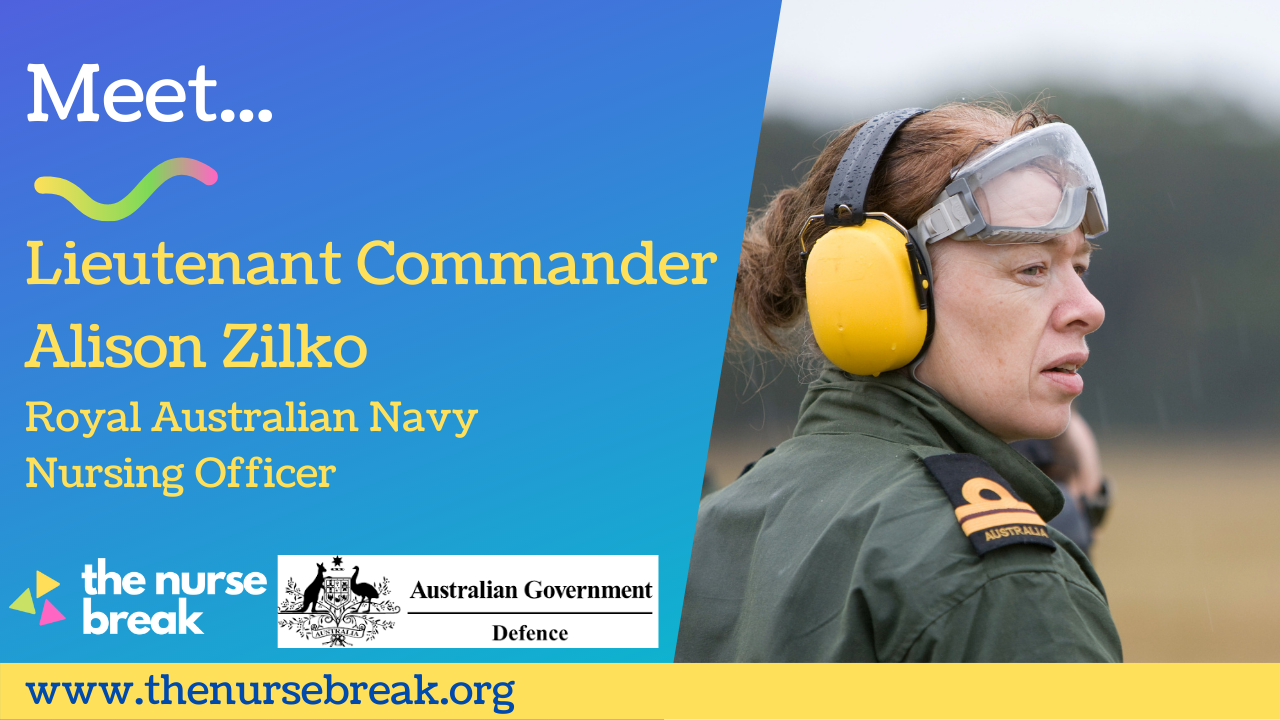




You must be logged in to post a comment.